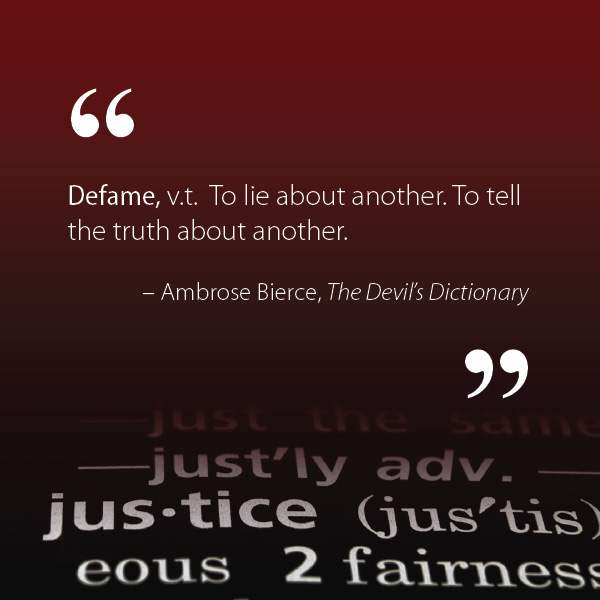 Let’s begin by sketching a fictional but plausible scenario.
Let’s begin by sketching a fictional but plausible scenario.
Dan Ascot is a librarian who works at the University of Western Nebraska. One day, in 2009, he posts a few remarks about a publisher on his blog. He says that Knightsbridge Press, a publisher of scholarly books in Massachusetts, produces “over-priced works of dubious scholarship.” He also describes the company as a “third-rate publishing house.”
Ascot believes that he’s stating the truth. In fact, he believes that he’s providing a professional opinion to prospective buyers of the publisher’s books. Knightsbridge Press is unhappy about the criticism. But because Ascot lives in the United States, he and his blog are protected by the First Amendment and US defamation law. The publisher can do little but complain.
In 2010, however, Ascot moves to Ontario to begin a new job at Macdonald-Cartier University. The university begins hosting Ascot’s blog. Knightsbridge Press notices that Ascot has moved into a new jurisdiction. The publisher complains in writing to the university about Ascot’s old blog post and demands that it be taken down. University executives, thinking the complaint is without merit, refuse to comply with the demand.
Finally, Knightsbridge Press files a defamation lawsuit in Ontario’s Superior Court of Justice against Ascot and the university. The publisher asks for $3 million to compensate for the damage that allegedly has been done to the company’s reputation and business prospects. An uproar ensues in the news media about Ascot’s free expression rights, but the publisher insists on having his day in court.
Why should you, as a Canadian editor, pay attention to such a story?
Although this dispute may seem remote from your daily copy editing and proofreading tasks, you may draw a few important lessons to help you when you work on contentious, legally sensitive text.
First, do not assume that defamation laws in Canada and the United States are similar. They are, in fact, different. A published text that safely and legally criticizes the reputation of a person or company in the United States may attract a defamation lawsuit if the text is published in Canada.
Second, do not assume that you are immune from a defamation lawsuit in Canada just because you or your author believe that the hard-hitting remarks about a person or company in the text are truthful, professional or fair. If the published remarks are sufficiently negative, you could still attract a defamation lawsuit.
Third, do not assume that you are immune from a defamation lawsuit in Canada just because you are posting text online. The law of defamation applies to blogs, Facebook, Twitter and other online media just as the law applies to books, newspapers, magazines and other print and broadcast media.
Fourth, make the effort to learn the basics of Canadian defamation law. Even reading the relevant pages in the newest Canadian Press Stylebook will help. You’ll be able to detect and flag dangerous passages while editing unpublished text. Then refer the passages to a competent lawyer for risk assessment.
Fifth, remember that defamation disputes in Canada are expensive. The costs begin when you hire a defence lawyer. Damages, if awarded to the plaintiff, can climb into five, six and even seven figures. Out-of-court settlements can be expensive too.
Finally, remember that there are legal defences to defamation lawsuits. In Canada, they include truth, fair comment, privilege and responsible communication. But the best defence occurs before publication when a competent lawyer vets the text for potentially defamatory statements and suggests legally acceptable revisions.
Discover more from L'HEBDOMADAIRE DES RÉVISEURS
Subscribe to get the latest posts sent to your email.
